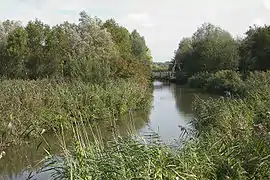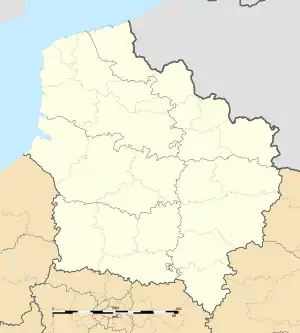Clairmarais
Klaarmares | |
|---|---|
 Romelaëre nature reserve | |
 Coat of arms | |
Location of Clairmarais | |
 Clairmarais  Clairmarais | |
| Coordinates: 50°46′27″N 2°18′03″E / 50.7742°N 2.3008°E | |
| Country | France |
| Region | Hauts-de-France |
| Department | Pas-de-Calais |
| Arrondissement | Saint-Omer |
| Canton | Saint-Omer |
| Intercommunality | Pays de Saint-Omer |
| Government | |
| • Mayor (2020–2026) | Damien Morel[1] |
| Area 1 | 18.02 km2 (6.96 sq mi) |
| Population | 587 |
| • Density | 33/km2 (84/sq mi) |
| Time zone | UTC+01:00 (CET) |
| • Summer (DST) | UTC+02:00 (CEST) |
| INSEE/Postal code | 62225 /62500 |
| Elevation | 1–34 m (3.3–111.5 ft) (avg. 9 m or 30 ft) |
| 1 French Land Register data, which excludes lakes, ponds, glaciers > 1 km2 (0.386 sq mi or 247 acres) and river estuaries. | |
Clairmarais (French pronunciation: [klɛʁmaʁɛ]; West Flemish: Klaarmares) is a commune in the Pas-de-Calais department in the Hauts-de-France region of France.[3]
Geography
A farming village situated in reclaimed marshland, 2 miles (3 km) northeast of Saint-Omer, on the D209 road. The Neufosse Canal, which connects the rivers Aa and Lys, passes by the commune.
Population
| Year | Pop. | ±% p.a. |
|---|---|---|
| 1968 | 410 | — |
| 1975 | 480 | +2.28% |
| 1982 | 598 | +3.19% |
| 1990 | 687 | +1.75% |
| 1999 | 689 | +0.03% |
| 2007 | 648 | −0.76% |
| 2012 | 627 | −0.66% |
| 2017 | 624 | −0.10% |
| Source: INSEE[4] | ||
History

It owes its origin to the famous Cistercian abbey founded by St. Bernard in 1140.
He gave the village the name of Claromarisco (later to be Clarus Mariscus and then Clermarez) because of the huge marshes and many rivers in the vicinity. The Dutch Klaarmares and West Flemish Cleremeersch names reflect the nature of the terrain, too.
Clairmarais became a fully-fledged common in 1790 when the abbey was going to be destroyed and sold as a national asset during the French Revolution.
During World War I, the Royal Flying Corps, and later Royal Air Force, operated from Clairmarais aerodrome.[5]
Places of interest
- The church of St. Bernard, dating from the nineteenth century.
- A windmill.
- Vestiges of the 13th century abbey including the remains of the entrance to the abbey with gatehouse buildings, a chapel and dovecote.
- The eighteenth century Cistercian farm of Cloquette.
- The cave of Notre-Dame de Lourdes which is host to a pilgrimage on August 15. It is the largest in France, north of the Seine.
- The Romelaëre national nature reserve.[6]
See also
References
- ↑ "Répertoire national des élus: les maires". data.gouv.fr, Plateforme ouverte des données publiques françaises (in French). 2 December 2020.
- ↑ "Populations légales 2021". The National Institute of Statistics and Economic Studies. 28 December 2023.
- ↑ INSEE commune file
- ↑ Population en historique depuis 1968, INSEE
- ↑ O'Connor, Mike. Airfields and Airmen: The Channel Coast. pp. 171–173. ISBN 9781844152582.
- ↑ JO; Decree No. 2008-220 of 5 March 2008 covering creation of the national nature reserve "Romelaëre Lakes" Nord and Pas-de-Calais
External links
- A Clairmarais website (in French)
- Another Clairmarais website (in French)